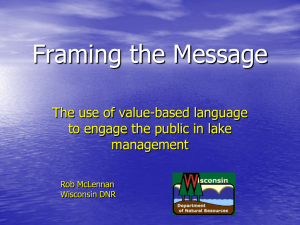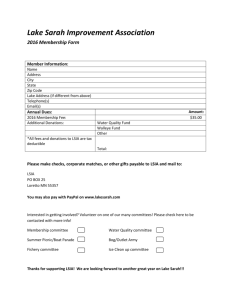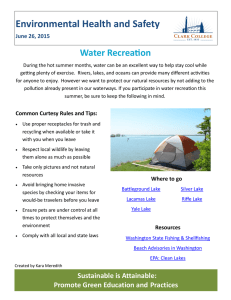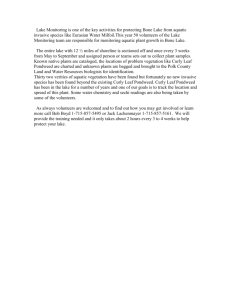Framing the Message The use of values-based language management
advertisement
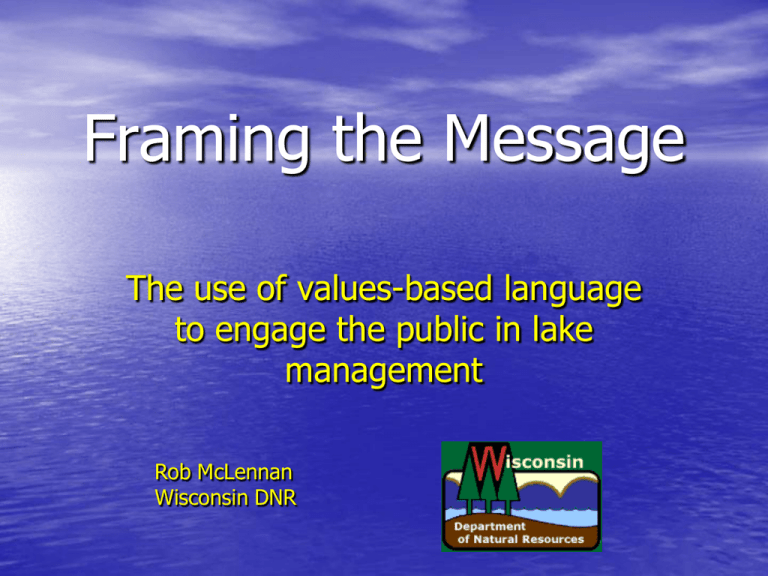
Framing the Message The use of values-based language to engage the public in lake management Rob McLennan Wisconsin DNR What is a Frame ? • A frame is the context in which an issue is discussed. • A frame is defined by the words and language used to talk about an issue. • The language used leads people to think about an issue in a specific way. The Challenge…………. “When Americans think about environmentalism [lake management]…., research shows, they all too often think: elitist; anti-jobs, anti-business, anti-technology; more concerned with critters than people; willing, for instance to sacrifice loggers and their families for the sake of owls [or sacrifice a dream home and manicured shoreline for the sake of a few frogs and turtles]. They are considered extremist "doom and gloomers" who oppose progress and prosperity…” “… many environmental messages fall into the trap of actively reinforcing the frame that [environmental protection] equals decline”. -Alex Steffen, 2004 Lake management tools can be seen as an unreasonable burden that prevent people and businesses from maximizing self interest and profit This is the “It’s all about me!” era Nothing should impinge on perceived personal freedoms Agricultural Performance Standards Zoning & Planning Pier Regulations Aquatic Plant Management Regulations Lawn Fertilizer Controls Shoreland Buffers Stormwater Management Why do we need to frame Lake management messages? We need to create a setting where: - Habitat Protection & Management - Exotic Species prevention and control - Watershed Management - Water Quality Regulations, & - Wise Shoreland Management = Community prosperity Enhanced personal gratification & A bright economic future Unnecessary Burden / Assault on Personal Freedoms ? Path to Personal Satisfaction and Community Prosperity Need to understand the role of language & values……… Example 1: Tax Relief………….Not Tax Cuts or Tax Reduction (George Lakoff, 2004) • Implies an unnecessary burden or affliction • It makes taxpayers victims in need of rescue • Those who would relieve the affliction are seen as heroes • Those who oppose giving relief are therefore, villains Reframe: • Taxes pay for our roads, interstates, water • • • • supply, sewage treatment, schools, national defense, homeland security, etc. They are investments in the future. We benefit today from the taxes paid by others last year and over the last decades Taxes support the common good and should be fairly apportioned Patriotic Americans pay their fair share to maintain our way of life and to protect our individual, community, and national security Taxes are essential to preserve the American way of life Example 2: Shallow Lake Water Level Management Large Boat Frame: Boaters need deeper water in order to fully enjoy their sport. Without deeper water marinas will close, property values will decline, people will move away, and the economy will suffer. Water levels must meet boater expectations. Traditional Lake Manager Response • Talk about macrophytes in the littoral zone • Habitat for amphibians and centrarchids • Valliseneria, Scirpus, & Potamogeton • Milligrams of this • Micrograms of that • Eutrophication • TSI numbers • Charts and graphs ug/l chlorophyll-a • Reality Check……….. Scientific facts will rarely trump a carefully conceived frame Limnology 101 Effective Frames or Re-frames focus on values: Community • Fairness • Responsibility • Unity • Prosperity • Progress • Cooperation • Balance • Justice • Accountability • Health, Safety, and Security Personal • Tranquility • Serenity • Healthy relationships • Harmony • Economic security • Satisfaction • Family time • Relaxation • Recreation • Privacy Re-framing Water Levels & Boating • Artificially high water will jeopardize what the community values; clean water & a healthy fishery. • Families, particularly children, deserve to have a clean, healthy lake to enjoy. • We have a responsibility to support what is right for clean water, fish, & wildlife. • Clean water & a healthy fishery increases property values, creates jobs, and supports the local economy. • It is important to invest in the health of our lakes. • Balanced and fair water level management is right for your community. • Recreational expectations should match the character of the water body. Obvious Conclusions……! A specific segment of the boating community is gambling with the character and economic stability of the lake community by putting clean water, fish, and wildlife at risk. The lake should not be modified & exploited to satisfy the recreational desires of a few boaters. The outcomes of higher water run counter to widely held community values, and are therefore, unreasonable. Re-Framing is not deceptive. • It is not spin • It is not propaganda • It simply means telling the truth from a different, values-based perspective Key Points: • Framing of lakes issues will be more effective if other natural resource messages are framed in a similar manner • When the media and public adopt re- framed terminology, we’re well on our way to changing minds and policies Example 3: Long Lake Management Plan; A Logical Approach • Identify key audiences • Determine their values • Match value-based messages to each audience. Goal 1. Protect water clarity; prevent algae blooms; reduce nutrient levels in the lake Families and individuals, particularly our children, deserve to have a lake with clean water to use and enjoy. Protecting water quality will be achieved by reducing the spring turnover total phosphorus concentration to 16-18 ug/l and summer surface total phosphorus concentration to 14-15 ug/l….…Reducing the total phosphorus concentration will require reducing the controllable inputs of phosphorus to the lake by 50 to 90 percent and minimizing inputs of future sources of phosphorus. Goal 2. Protect and restore healthy, stable shoreland habitats Restoring and protecting shorelands will provide privacy and tranquility as well as a natural space for families to enjoy nature. Several of the existing developed shorelands lack adequate natural buffers which provide critical habitat and protect water quality. Restored and properly maintained shoreland buffers will provide water quality protection and provide critical habitat areas for water dependent wildlife and aquatic life. Goal 3. Protect and improve diverse aquatic life, including the fishery and aquatic plant community Leaving fallen trees in the water and protecting high quality aquatic plants will improve fishing for anglers and many generations of future anglers. Healthy lake ecosystems are valuable natural resources for shoreland property owners and all lake users. Fish populations will be protected and improved by maintaining good water quality conditions, improving in-lake habitat conditions, protecting high quality aquatic plant populations and managing angler harvest. It is critical to protect existing high quality in-lake habitats for fish and aquatic life as well as restore degraded habitat areas. Points to Remember: • A frame is the context in which an issue is discussed • A frame is defined by the words and language used to talk about an issue • The language used leads people to think about an issue in a specific way • Effective frames focus on personal and community values Thank you for your time and attention
